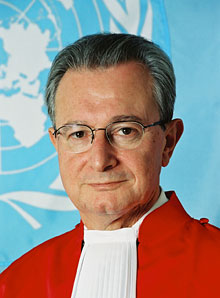I am deeply honoured to assume the Presidency of the ICTY at a crucial moment, shortly before it closes its doors. In many ways, the task of closing down the Tribunal will be as challenging as it is painful and unenviable. But it is a role that I have willingly chosen and with which my colleagues have entrusted me, and I intend to accomplish it with determination and to the very best of my abilities. Indeed I feel privileged and grateful in having been elected to accomplish this task.
I am also fortunate in that I take office at a time when the Tribunal is strong and has been prepared for its last biennium by the unstinting and outstanding work of my recent predecessors, Judges Fausto Pocar, Patrick Robinson and Theodor Meron. I therefore start by paying tribute to them and in particular to my immediate predecessor, Judge Meron, who has been at the helm of the Tribunal for the past four years. Judge Meron has been a fierce defender of international humanitarian law and international criminal law and has been pivotal in helping this Tribunal inflict a serious blow to impunity. He has strongly defended the work of the Tribunal and its judges, and has left no stone unturned in ensuring that the Tribunal has the people and resources necessary to fulfil its mandate.
On this occasion I also wish to pay tribute to all those whose dedication and efforts have allowed the Tribunal to flourish and become robust. In particular I pay tribute to the judges, permanent and ad-litem, past and present, who have worked so hard to make this, the first serious experiment in the fight against impunity after the Nuremberg and Tokyo tribunals, a tremendous success. I also pay tribute to the prosecutors, the registrars and the legal officers who have enriched the Tribunal with their knowledge and expertise. Last but not least, I recognise the crucial contribution of other staff in all sections of the Tribunal to the smooth functioning and success of this institution. We have worked together for over twenty years and have significant achievements to show for our combined efforts. I sincerely thank you all.
Now, it is vitally important to continue and augment our cooperation with a view to closing down this Tribunal at the end of 2017 in an efficient, professional and exemplary manner. In doing so, we have an enormous responsibility. We have a responsibility towards the United Nations Security Council, to whom we owe our existence and without whose support we would not have been able to succeed as we have. We have a responsibility towards international humanitarian law and international criminal law, which we have tremendously enriched with our jurisprudence. We have a responsibility towards justice, due process and the fair trial rights of the accused, which must be paramount. We have a responsibility to the legacy that we will leave behind when we finish our journey. We have a responsibility towards victims and their families.
Indeed, although there are just two years left until our mandate expires, much remains to be done. It is expected that by the end of this year, we will have disposed of the Stanišić and Simatović appeal as well as the massive, multi-accused ICTR Nyiramasuhuko et al. appeal. Another ICTY appeal, Stanišić and Župljanin, will be decided in June 2016, and during the first quarter of next year, judgements in the Karadžić and Šešelj trials are expected to be issued. I also anticipate that the Hadžić trial will be decided during 2016. When we come to that stage, our efforts will then focus on closing down the Tribunal and bringing to an end the Mladić trial and the Prlić appeal, the biggest and most complicated appeal the Tribunal has had for many years.
The Tribunal stands committed with the Security Council to close the doors of this institution by the end of 2017. With this goal in mind, together with the relevant stakeholders I will make sure that all chambers are adequately equipped with the staff and resources needed to conclude their work. This will not be easy. Among other factors, the increasingly alarming and continuous drain of experienced staff, while understandable, constitutes a serious threat to our genuine efforts to finish our mandate in time. This is a matter that I intend to raise with the Security Council and other interlocutors during my impending mission to the United Nations in New York. I remain hopeful, however, because I believe that we and the Security Council share the same goal and aspiration, namely that of bringing to a successful conclusion this first big experiment in international criminal justice.
We are now at a crucial moment in the Tribunal’s history. I am certain that my colleagues and our precious staff, under my guidance, will do their utmost to ensure that the Tribunal will continue to serve as an embodiment of the international community's noblest aspirations for justice. Today, as I take office, I make my commitment to do the same.


